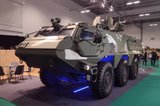Czech Republic starts talks with Sweden for purchase of CV90s
CV90 IFV. (Photo: Czech MoD)
After announcing the selection of the CV90 IFV to replace its obsolete fleet of BVP-2 (BMP-2), the Czech Republic started negotiating the acquisition of the vehicle with the Swedish government.
A press release issued by the Czech MoD on 2 September noted that the service has handed over the complete technical requirements for the platform, and the Swedish representatives undertook to deliver a complete production plan that will enable the maximum involvement of the Czech industry.
In addition to involving national companies in the production of the CV90, the negotiations will also cover the supply chain and life cycle of the vehicle.
The purchase of this platform is part of the Czech commitment to NATO to build the 7th Mechanised Brigade and enhance the Alliance’s ground capacities in Central Europe.
The Czech MoD announced its intention to procure the CV90 in July after facing several obstacles to progress with its IFV programme.
On 27 August, the Czech Republic also signed an agreement with Slovakia to cooperate in the acquisition and operation of these platforms as Slovaks are also planning to acquire the CV90.
Related Programmes in Defence Insight
Related Equipment in Defence Insight
More from Land Warfare
-
![US DoD task force’s DroneHunter acquisition lays groundwork for Replicator 2 CUAS strategy]()
US DoD task force’s DroneHunter acquisition lays groundwork for Replicator 2 CUAS strategy
As the US Department of Defense looks to counter the growing threat of uncrewed aerial systems to improve homeland security, the DroneHunter acquisition could point to future commercial innovation.
-
![Norway opts for Hanwha’s Chunmoo for long-range fires under $2 billion deal]()
Norway opts for Hanwha’s Chunmoo for long-range fires under $2 billion deal
The selection of Hanwha’s K239 Chunmoo long-range precision fires system, with a contract expected to be signed on 30 January, makes Norway the second European country to choose the system. It is expected an operational system will be in service within four years.
-
![Layered protection: How air defence is adapting to rising drone and missile threats (podcast)]()
Layered protection: How air defence is adapting to rising drone and missile threats (podcast)
A surge in aerial threats – from advanced missiles to low-cost drones – is reshaping the way militaries approach air defence, driving demand for flexible, multi-layered solutions.























